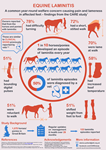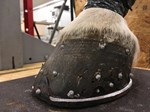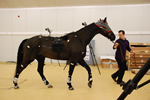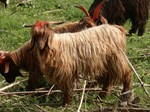Search - All Results
11 - 20 of 1718 results
-
Equine Laminitis Summary of Published RVC Research
Summary of RVC Endocrinopathic equine laminitis research -
MSci Applied Biological Research – available with placement year
An undergraduate integrated masters degree, offered by The Royal Veterinary College (London, UK), with an industrial placement, to prepare you for a PhD or a career in an industrial or academic research environment -
New equine research reveals laminitis is as common as colic and is a year-round threat
One in 10 horses or ponies may develop at least one laminitis episode each year, making it just as common as colic, according to a new study led by Dr Danica Pollard, a PhD student at the Royal Veterinary College. The research was conducted by the … -
New editorial calls for more farrier research
A recently published editorial in the Equine Veterinary Journal, written by members of the Royal Veterinary College’s Structure and Motion groups highlights the need for further farriery research. -
Equine Stem Cell Therapy Research
The Royal Veterinary College pioneered the first use of stem cell therapy for tendon injuries in horses. Equine stem cell therapy is also being used for equine joint disease treatment at RVC Equine -
New research from the RVC furthers understanding of the role of muscles and tendons
A new study from the Royal Veterinary College (RVC), has uncovered how muscles and tendons work together in order to transfer weight without exerting unnecessary energy. This research is an important step in better understanding the role of muscles … -
RVC research team is one step closer to objective detection of horses with ataxia
Researchers at the Royal Veterinary College have developed a method of objective evaluation that can help differentiate horses with ataxia, a neurological disorder resulting in an uncoordinated or drunken gait, from those with other mobility issues. -
New research sheds light on the so-called ‘Croydon Cat Killer’ case
New research sheds light on the so-called ‘Croydon Cat Killer’ caseNew research from the Royal Veterinary College (RVC) has shed light on the spate of mutilated cats …
-
New research traces origins of zoonotic disease to the Neolithic period
Study provides evidence for hypotheses about the effects of farming on human and animal health and wellbeingNew research has investigated the possible origins of the common zoonotic disease brucellosis in …
-
The RVC calls for canine health research funding data
Researchers at the Royal Veterinary College (RVC) are calling on specialist veterinary and non-university organisations that carry out research into canine health and welfare to participate in a study which seeks to inform future funding strategies. …







